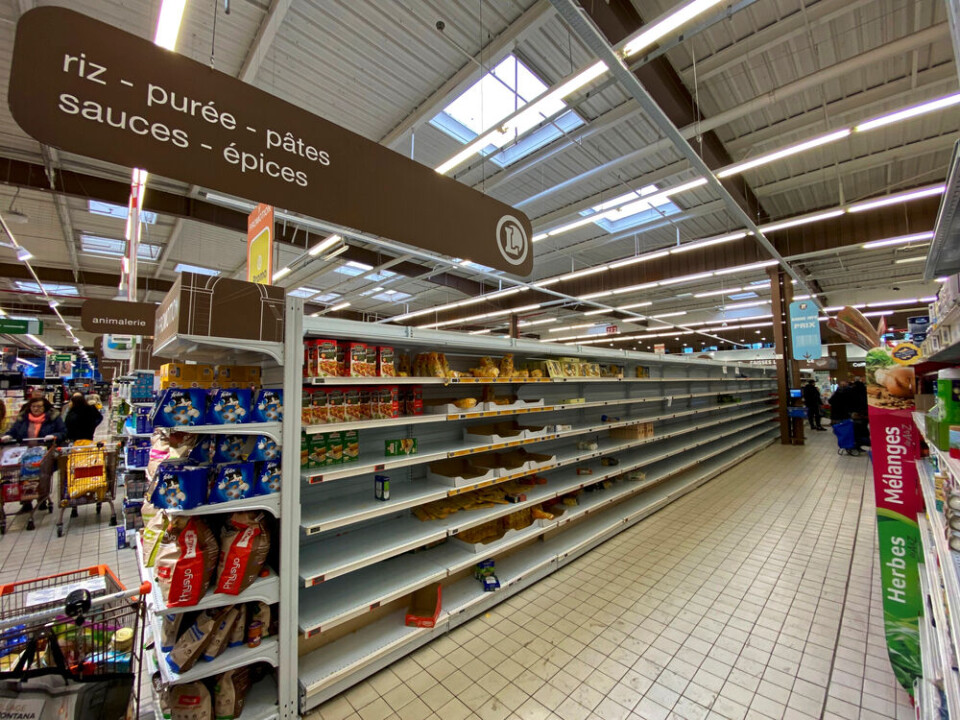-
How many Americans live in Paris - and where else are they choosing in France?
Over a quarter of all US nationals in France live in the capital city
-
Price rises for Netflix in France
The Standard (with ads) and Premium packages are increasing by €24 a year
-
Leclerc supermarkets to sell car fuel at cost price for Easter
The initiative will apply to diesel, petrol, and LPG
Which supermarket foods are running low due to French farmer protest?
Shops and restaurants face delivery delays in some areas

Shops and restaurants in some areas face delays resupplying their stock due to the ongoing farmers’ protests around France. We look at which products are affected and how the supply chain is coping.
The farmers’ protest has been going on since January 20, with roadblocks and rolling blockades on roads and motorways.
Read more: January 30: See which roads are blocked by French farmer protests
In some places the protesters have been stopping delivery vehicles and emptying their produce on the road or simply blocking deliveries to supermarkets.
In one recent incident 30,000 litres of Spanish red wine was emptied onto the road by farmers in Bagnols-sur-Cèze (Gard).
The protesters argue that produce from Spain bypasses the EGalim law intended to protect the price of French produce.
A #Amiens, les #agriculteurs arrivent au Leclerc de #Rivery #manifestation => https://t.co/XcwOqryuo9 pic.twitter.com/K97vvv1jcC
— Courrier picard (@CourrierPicard) January 30, 2024
How are supermarkets coping with delivery delays?
So far the delays have not affected consumers significantly but this is now changing in some areas, especially for restaurants.
“Hypermarkets keep 20 days of stock for imperishable products,” logistics specialist Philippe Goetzmann told Europe 1. “But for perishable products it’s usually around seven days worth of stock.”
This means that customers in affected areas are likely to notice gaps appearing on supermarket shelves where fresh fruits and vegetables should be.
“We are trying to reorganise the shelves to hide the gaps,” one supermarket employee in Grenoble (Isère) told FranceBleu. “Many of our products come from Montélimar, and the roads are blocked”.
Vincent Poun, the manager of Super U in Grenoble said that there were no delivery problems per se, just delays.
“We need to be transparent to avoid creating panic,” he said. “If clients decide to stock up needlessly on five packs of pasta instead of just buying two, then we will be short.
“The products exist, they are on the way, but might just be a little late.”.
The head of Lidl France, Michel Biero, reaffirmed this point, telling Le Parisienon January 29 that none of the company’s 25 logistics centres were blocked.
However, there is growing concern that the accumulation of delays could lead the situation to deteriorate by midweek, particularly for fruit and vegetables delivered from Spain.
Restaurants face supply problems
Unlike the extensive logistic networks that keep supermarkets supplied, restaurants keep smaller stocks of a limited variety on site. Their specific needs make them more vulnerable to resupply problems.
“The only restaurants that aren’t worried are the ones that reheat frozen dishes”, restaurant owner Laurent Chopin told Le Parisien.
Sandra Moine, a restaurant owner in Coublevie, Isère, told FranceBleu on January 29 that the supply difficulties were already beginning to bite.
“I managed to serve my customers with my reserves yesterday, but today my fridges are empty,” she said.
“My worst nightmare is having to relive the Covid experience: sitting at a table in my empty restaurant.”
How is the supply chain coping?
The delivery delays are on a local level, particularly at smaller supermarkets in areas supplied by blocked motorways.
However, the logistics network is expected to be able to adapt.
“The distribution sector is highly flexible, and is used to managing crises that most people never hear about,” logistics specialist Karine Sanouillet told TF1, adding that many supply lorries were already switching their delivery routes to avoid the farmers’ roadblocks.
Read more:
SEE: support for French farmer protests higher than for gilets jaunes
Pancakes, French school holidays: key February dates for your diary
























